External links
- (in German) http://www.kirchenlexikon.de/m/masen_j.shtml
Jacob Masen [1] (28 March 1606 - 27 September 1681) was a German Jesuit priest, historian, dramatist and theologian. He is known as a prolific writer in Latin. [2]
He was born at Dahlen in Jülich, and studied in Cologne. Having entered the Order of Jesus in 1629, he taught poetry and rhetoric in the Lower Rhine region. After theological studies he was ordained priest between 1639 and 1641. On the 3 May 1648 he took his final vows in Cologne. where he also acted as a preacher. He also acted in Paderborn and Trier. [2] He died, aged 75, in Cologne.
He completed a substantial antiquarian work on Trier by Christoph Brouwer. [3]
His epic poem Sarcotis (1654) became notorious in the 18th century, after William Lauder alleged that John Milton had plagiarised it in writing Paradise Lost . [4]
With Jacob Bidermann, he was one of the most important Jesuit dramatists influencing German drama. [5]

Neo-Latin is the style of written Latin used in original literary, scholarly, and scientific works, first in Italy during the Italian Renaissance of the fourteenth and fifteenth centuries, and then across northern Europe after about 1500, as a key feature of the humanist movement. Through comparison with Latin of the Classical period, scholars from Petrarch onwards promoted a standard of Latin closer to that of the ancient Romans, especially in grammar, style, and spelling. The term Neo-Latin was however coined much later, probably in Germany in the late 1700s, as Neulatein, spreading to French and other languages in the nineteenth century.

Jakob Balde, a German poet who wrote primarily in Neo-Latin rather than in his native German language, was born at Ensisheim in Alsace.

Jacob Sprenger was a Dominican inquisitor and theologian principally known for his association with a well-known guide for witch-hunters from 1486, Malleus Maleficarum. He was born in Rheinfelden, Further Austria, taught at the University of Cologne, and died in 1495 in Strasbourg.
This article contains information about the literary events and publications of 1733.
This article contains information about the literary events and publications of 1681.

Friedrich Spee was a German Jesuit priest, professor, and poet, most well known as a forceful opponent of witch trials and one who was an insider writing from the epicenter of the European witch-phobia. Spee argued strongly against the use of torture, and as an eyewitness he gathered a book full of details regarding its cruelty and unreliability. He wrote, "Torture has the power to create witches where none exist."
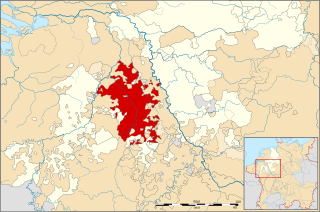
The Duchy of Jülich comprised a state within the Holy Roman Empire from the 11th to the 18th centuries. The duchy lay west of the Rhine river and was bordered by the Electorate of Cologne to the east and the Duchy of Limburg to the west. It had territories on both sides of the river Rur, around its capital Jülich – the former Roman Iuliacum – in the lower Rhineland. The duchy amalgamated with the County of Berg beyond the Rhine in 1423, and from then on also became known as Jülich-Berg. Later it became part of the United Duchies of Jülich-Cleves-Berg.
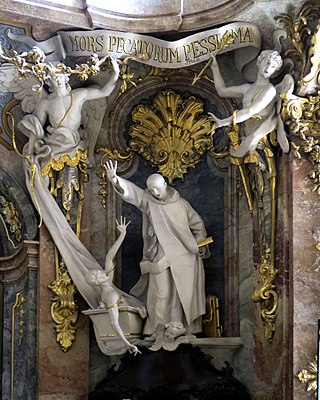
Cenodoxus is one of several miracle plays by Jacob Bidermann, an early 17th-century German Jesuit and prolific playwright. Jacob Bidermann's treatment of the Legend of the Doctor of Paris is generally regarded as one of the inspirations for Goethe's Faust.

The Electorate of Trier was an ecclesiastical principality of the Holy Roman Empire that existed from the end of the 9th to the early 19th century. It was the temporal possession of the prince-archbishop of Trier who was, ex officio, a prince-elector of the empire. The other ecclesiastical electors were the electors of Cologne and Mainz.

The Catholic Archdiocese of Luxembourg is an archdiocese of the Latin Church of the Catholic Church in the Grand Duchy of Luxembourg, comprising the entire Grand Duchy. The diocese was founded in 1870, and it became an archdiocese in 1988. The seat of the archdiocese is the Cathedral of Notre Dame in the city of Luxembourg, and since 2011 the archbishop is Jean-Claude Hollerich.
Nationality words link to articles with information on the nation's poetry or literature.
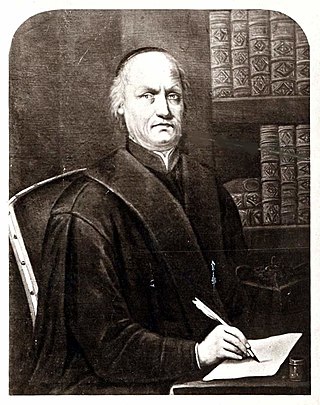
Christoph Brouwer was a Jesuit priest of the Netherlands, and ecclesiastical historian. He is particularly known for his contribution to the history of the Archdiocese of Trier.

Johann Ladislaus Pyrker (von Oberwart)(von Felsö-Eör) (Hungarian: felsőőri Pyrker János László; 2 November 1772 in Nagyláng, Soponya, near Székesfehérvár, Hungary – 2 December 1847 at Vienna) was a Hungarian Cistercian abbot, archbishop and poet.
Jesuit drama was a form of theatre practised in the colleges of the Society of Jesus between the 16th and 18th centuries, as a way of instructing students in rhetoric, assimilating Christian values and imparting Catholic doctrine.

Sidronius Hosschius, latinised form of Syderoen de Ho(o)sch, also known as Sidronius de Hossche and Sidron de Hossche was a Flemish poet and Jesuit priest. His contemporaries held him in great esteem for his elegant Latin verse and his works were reprinted several times during the 17th and 18th centuries.
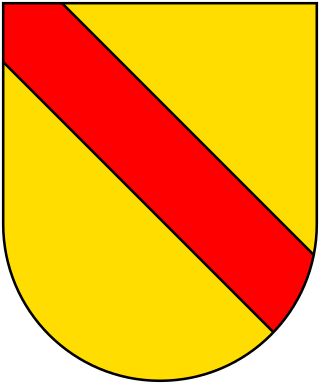
John II of Baden was a titular Margrave of Baden and was Archbishop and Elector of Trier as John II of Baden from 1456 until his death in 1503.
Christian Latin literature has a long history with its foundations being laid during the 4th and 5th centuries. They included the church fathers Augustine of Hippo, Jerome, and Ambrose, and the Christian poet, Prudentius.

The elector of Trier was one of the prince-electors of the Holy Roman Empire and, in his capacity as archbishop, administered the archdiocese of Trier. The territories of the electorate and the archdiocese were not, however, equivalent.
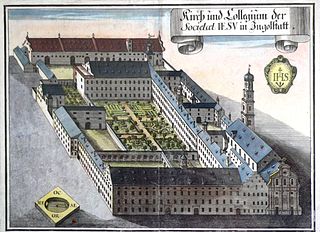
The Jesuit College of Ingolstadt was a Jesuit school in Ingolstadt, in the Duchy and Electorate of Bavaria, founded in 1556, that operated until the suppression of the Jesuit Order in 1773. The college was the headquarters of the Jesuits in Germany, and became a center of the Counter-Reformation. Many of its members taught at the University of Ingolstadt.